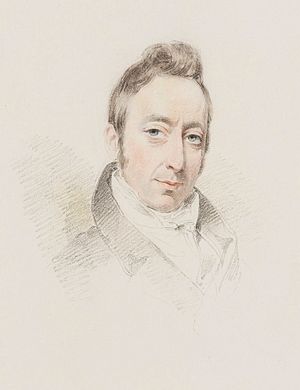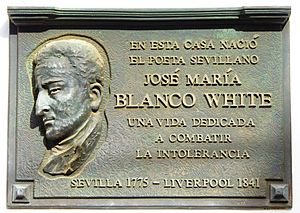Joseph Blanco White facts for kids
Joseph Blanco White was born José María Blanco y Crespo on July 11, 1775. He passed away on May 20, 1841. He was an important writer, thinker, and poet. He had both Spanish and English roots.
Contents
Joseph Blanco White's Life Story
Joseph Blanco White was born in Seville, Spain. His father, Guillermo Blanco, was a merchant from Ireland who had settled in Seville. His mother was María Gertrudis Crespo y Neve.
Joseph was trained to become a Roman Catholic priest. In Seville, he worked with Melchor de Jovellanos, who was an adviser to the king and wanted to make reforms. After becoming a priest in 1800, Joseph started to have doubts about his faith. Because of these doubts, he decided to leave Spain and move to England in 1810.
In England, he joined the Anglican Church. He studied theology at Oxford University. He also became good friends with famous people like Thomas Arnold and John Henry Newman. In 1831, he became a tutor for the family of Richard Whately, who was the Archbishop of Dublin. While working there, Joseph began to follow Unitarian beliefs. He found a new home among the Unitarians in Liverpool, where he died on May 20, 1841.
Writings Supporting Spanish America
From 1810 to 1814, Blanco White edited a Spanish magazine in London called El Español. This magazine strongly supported the independence of Spanish America. In its pages, he wrote about the progress of the independence movements. He used information from Spanish America and British sources.
The Spanish government, called the Regency, banned his magazine in Spain. This was because it went against their trade rules, which gave Spanish merchants a special right to trade. Other writers attacked him in newspapers. Even in the Spanish parliament, called the Cortes of Cádiz, he was criticized. However, articles from El Español were reprinted in newspapers that supported independence.
Blanco White did not want Spanish America to be completely independent at first. He preferred a more moderate approach. He wanted the Spanish parliament to recognize local governments, called juntas, in Spanish America. These juntas would remain loyal to the Spanish king, Ferdinand VII, after Napoleon invaded Spain in 1808. Napoleon had removed Ferdinand VII and put his own brother, Joseph, on the throne. Blanco White also believed in free trade, not just the old Spanish system that limited trade.
Other Important Works
Blanco White wrote several other important books. These include Doblado's Letters from Spain (1822), which he wrote using the pen name "Don Leucado Doblado." He also wrote Evidence against Catholicism (1825). Another work was Second Travels of an Irish Gentleman in Search of a Religion (1834). This book was a response to a satirical book by Thomas Moore. His book Observations on Heresy and Orthodoxy (1835) also showed his writing talent. All his works were widely read during his time.
He also translated important English books into Spanish. These included Paley's Evidences and the Book of Common Prayer.
Blanco White is also remembered for his famous sonnet, a type of poem, called "Night and Death." It begins with the line "Mysterious Night! when our first parent knew." This poem was dedicated to Samuel Taylor Coleridge when it appeared in a magazine in 1828. Since then, it has been included in many poetry collections.
See also
 In Spanish: José María Blanco White para niños
In Spanish: José María Blanco White para niños



